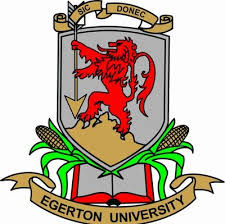Measurement is a very important activity in every branch of Engineering and Science. Instrumentation is a fundamental discipline and is understood well in terms of measurement systems. Instrumentation is important in product testing and quality control, monitoring in the interest of health, safety, cost, part of a control system, research and development, etc.
The ability to control effectively is often limited by the quality of measurements. Thus it is important for the Control Engineer to understand the quality and limitations of measurement systems. Similarly, the Instrument Engineer has to understand the nature and problems of a control system, and the quality and limitations of control philosophy.
The Bachelor of Science in Instrumentation and Control Engineering at Egerton University is designed to produce highly trained manpower in Instrumentation and Control Engineering ready to take up the challenges in industrial research, industrial and commercial organizations. The programme is broad-based and is developed so as to attain both academic and practical skills. It integrates instrumentation and control engineering systems. The programme is industry-oriented and is designed to produce graduate engineers capable of adapting to technological changes and in line with government policy of vision 2030.
Instrumentation and Control Engineers find career opportunities in a wide range of Fields such as industrial research, production and commercial organizations ranging from process industries to aero-space, economic and business modelling.
